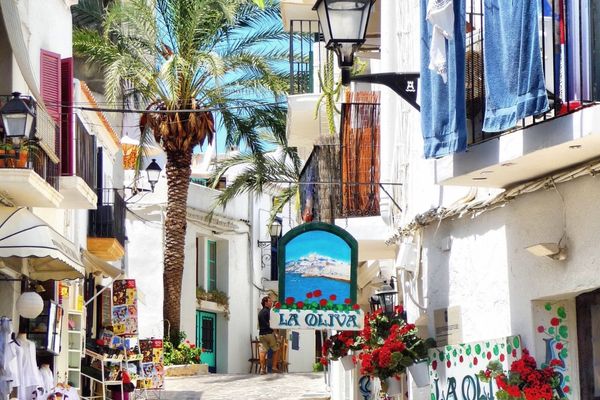While I am writing this article, I could use all these Spanish weather expressions for the summer because it’s August, it’s Spain and it’s hot!!
In Spain, we have the Mediterranean climate. This climate is characterized by slightly rainy springs and autumns with mild temperatures (about 18 – 20 ºC), winters with cold temperatures (in December and January we have negative temperatures and some years it has snowed in Spain in January or February) and dry and very hot summers.
Écija, in Seville, is one of the towns where the highest temperatures in Spain are reached in summer (up to 46ºC!). This town is known as “the frying pan of Spain“. I remember seeing how in one summer, locals in Écija fried an egg on the surface of the road. ¡Qué calor!
In this article you will discover five colloquial expressions that we Spaniards repeat over and over again during the summer. You will also enjoy two beautiful traditional sayings that show the popular wisdom when talking about the seasons. So, if you come to spend your holidays in Spain in July or August, and you want to astonish everyone around you on the beach or in the chiringuito, memorize some of these expressions and take advantage of the right moment to say them in front of your friends.

In order for you to better understand these Spanish weather expressions for the summer let’s see their origin and examples using them in context.
1. Me muero de calor.
Obviously, this expression does not literally mean that you are dying, but it expresses the extreme vital need that you are experiencing at that moment. We use this expression “Me muero de…” with other vital needs or intense emotions. For example, me muero de hambre, me muero de sed, me muero de sueño, me muero de risa, me muero de aburrimiento…
Let’s look at an example in context with this expression:
2. Me estoy achicharrando / Me estoy asando.
“Achicharrar” and “asar” are two verbs that we use to cook. What do we also use for cooking? The heat, the fire. So this is a metaphor for how we feel when it ‘s really hot. “Achicharrar” is when we cook something too long or with too much heat intensity. That’s why, as native speaker, I use “me estoy asando” when I’m too hot and I use “me estoy achicharrando” when I’m really tooooooooo hot.
3. ¡Qué bochorno hace!
The word “bochorno” (embarrassment) is a feeling that we have when we experience a lot of embarrassment. Has it ever happened to you? You are in an embarrassing situation, and you start to sweat, you turn red, you start to feel hot… That’s why, in summer, we use this expression that indicates that we feel like this, sweating, a little red… not because we’re embarrassed, but because we’re getting very hot. My grandmother Julia used to use this expression a lot, I still remember her saying: “Anoche no pude dormir porque hacía mucho bochorno”.

4. ¡Cómo aprieta el Lorenzo! / ¡Cómo pega el Lorenzo!
In Spain we have given the sun a name. His name is Lorenzo. Why? Well, because on August 10, one of the most popular festivities in Spain is celebrated: San Lorenzo. At that time, we are in the middle of summer, when the sun reaches its peak in Spain. San Lorenzo is a tremendously popular festival here because it is the patron saint of drivers and because at that time, we can see the Perseids in the sky, also called shooting stars or “Tears of San Lorenzo”.
When we want to say that the sun has a very high intensity and strength and therefore it feels very hot, we use the colloquial jargon “apretar” (squeeze) or “pegar” (hit). That’s where this expression comes from.
Let’s look at an example in context with this expression:
5. Bajo un sol de justicia / Hace un sol de justicia.
In older days, there was a punishment in prisons that consisted of tying the prisoner and leaving him under the sun, without water or food. The prisoner suffering this way under the Spanish sun was considered a just punishment. This ancient punishment has given rise to this expression. Nowadays, it is an expression that is used a lot, especially in the media. Let’s look at an example:
Popular wisdom is reflected in proverbs and traditional sayings in all countries. In Spain we have these two proverbs that refer to summer and it complements the Spanish weather expressions for the summer that we have seen previously.

Hasta el 40 de mayo no te quites el sayo.
This saying means that until June 10 (May 40) the return of bad weather is possible. Therefore, do not take out all the summer clothes yet. “El sayo” was the name used by women in the past for their skirts. My grandmother Julia used to say this saying a lot.
Más vale una Nochebuena que cien Sanjuanes.
Here we have another phrase that my other grandmother, grandmother Basi, used to say a lot. This saying refers to the fact that after the night of San Juan (June 23) the days begin to shorten in the northern hemisphere and we are heading towards autumn, because we have just passed the summer solstice. However, after Christmas Eve (December 24) the opposite happens. The days are starting to get longer because we have passed the winter solstice in the northern hemisphere and we are heading into the warm, bright weather of spring.
To improve your use of colloquial expressions and use them like a native in your conversations, you need a good foundation of grammar and vocabulary. I encourage you to visit our Membership Programme, where you can find a complete collection of courses lasting about 30 minutes each, where you will practice a very specific aspect to master it perfectly. All our courses have a 10 – 12 minute video with the Your Spanish Hub teachers explaining the theory. They also have 4 or 5 self-correcting activities that you can do after watching the video to practice your grammar.
I’m finishing the article and do you know what’s going on? The intense heat that has been throughout the day is giving way to a summer storm. Sometimes this happens in Spain. In the afternoons, clouds begin to accumulate in the sky and suddenly, a brief and intense rain falls that refreshes the atmosphere. It is a very nice feeling and a fresh ending for this article.
¡Hasta pronto!
